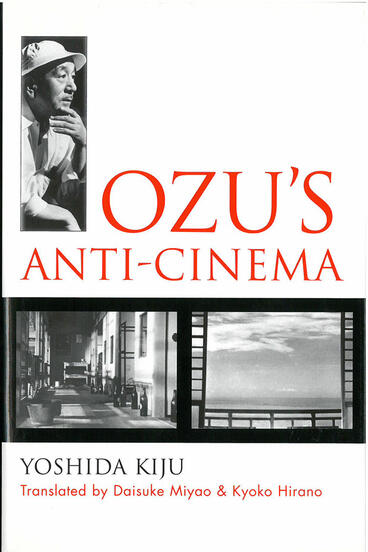A luminous exploration of one filmmaker’s work by another, an artist’s personal journey, a manifesto
Description
Yoshida starts his award-winning Ozu’s Anti-Cinema with a story about his trip to Ozu’s deathbed. Yoshida writes that a dying Ozu whispered to him twice, as if speaking to himself, “Cinema is drama, not accident.” These cryptic last words troubled Yoshida for decades, and throughout this book he examines Ozu’s films and tries to uncover what Ozu really meant. Ozu’s Anti-Cinema concerns Ozu’s films, but it is also Yoshida’s manifesto on films and filmmaking. In other words, this book is Yoshida’s personal journey into Ozu’s thoughts on filmmaking and, simultaneously, into his own thoughts on the nature of cinema. Every page displays the sensibility of one artist discussing another—this is probably a book that only a filmmaker could write. Within Yoshida’s luminous prose lies a finely tuned, rigorous analysis of Ozu’s films, which have rarely been engaged as closely and personally as here.
Yoshida Kiju, a key filmmaker of Shochiku New Wave cinema, entered Shochiku Studios as an assistant director. He worked primarily for director Kinoshita Keisuke, but he also found himself in close proximity to Ozu Yasujiro. Yoshida started directing
Reviews
“Like a film by Ozu, Yoshida’s book is a joy to revisit. One senses that it was created as a labor of love and also as a way of playing with multiple interpretations. In a way, subtle observations in Ozu’s Anti-Cinema also seem to ‘deny their own existence’—a stance that leaves us with tantalizing suggestions as it compels us to review the films themselves.”—Linda C. Ehrlich, The Journal of Asian Studies
“A brilliant and fascinating study and reminiscence of Ozu.”—Dennis Washburn, Journal of Japanese Studies
"A rare opportunity to read a distinguished auteur discussing the work of a truly exceptional film artist with discerning eyes and feelings of affection. Yoshida Kiju's book is permeated with a sense of sorrow, respect, and above all love for Ozu, who simultaneously believed in cinema's possibility as an art form and revealed its fundamental fragility."—Mitsuhiro Yoshimoto, New York University
“Yoshida Kiju’s book on Ozu Yasujiro, a colleague and mentor of Yoshida’s at Shochiku Studios, is rich in originality, genuinely challenging, and full of restrained emotions.”
—Hasumi Shigehiko, Film Critic

